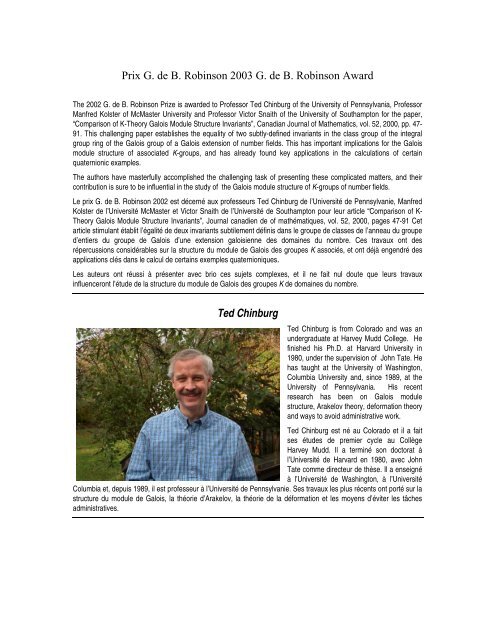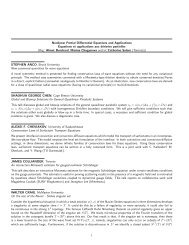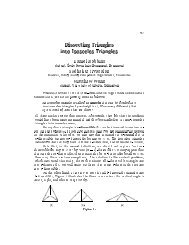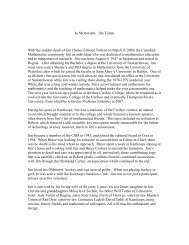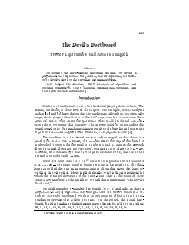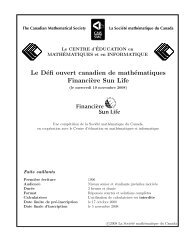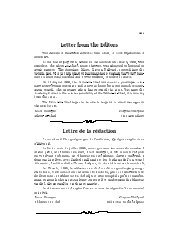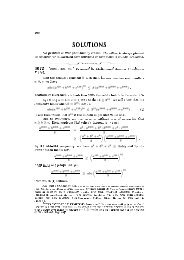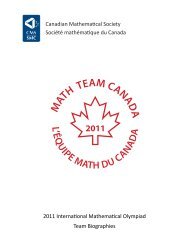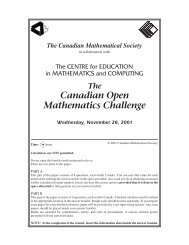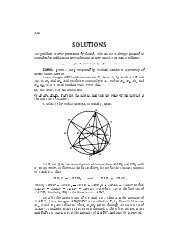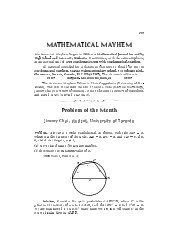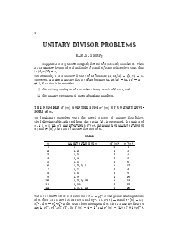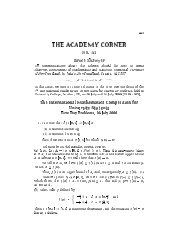Ted Chinburg - Canadian Mathematical Society
Ted Chinburg - Canadian Mathematical Society
Ted Chinburg - Canadian Mathematical Society
You also want an ePaper? Increase the reach of your titles
YUMPU automatically turns print PDFs into web optimized ePapers that Google loves.
Prix G. de B. Robinson 2003 G. de B. Robinson Award<br />
The 2002 G. de B. Robinson Prize is awarded to Professor <strong>Ted</strong> <strong>Chinburg</strong> of the University of Pennsylvania, Professor<br />
Manfred Kolster of McMaster University and Professor Victor Snaith of the University of Southampton for the paper,<br />
“Comparison of K-Theory Galois Module Structure Invariants”, <strong>Canadian</strong> Journal of Mathematics, vol. 52, 2000, pp. 47-<br />
91. This challenging paper establishes the equality of two subtly-defined invariants in the class group of the integral<br />
group ring of the Galois group of a Galois extension of number fields. This has important implications for the Galois<br />
module structure of associated K-groups, and has already found key applications in the calculations of certain<br />
quaternionic examples.<br />
The authors have masterfully accomplished the challenging task of presenting these complicated matters, and their<br />
contribution is sure to be influential in the study of the Galois module structure of K-groups of number fields.<br />
Le prix G. de B. Robinson 2002 est décerné aux professeurs <strong>Ted</strong> <strong>Chinburg</strong> de l’Université de Pennsylvanie, Manfred<br />
Kolster de l’Université McMaster et Victor Snaith de l’Université de Southampton pour leur article “Comparison of K-<br />
Theory Galois Module Structure Invariants”, Journal canadien de of mathématiques, vol. 52, 2000, pages 47-91 Cet<br />
article stimulant établit l’égalité de deux invariants subtilement définis dans le groupe de classes de l’anneau du groupe<br />
d’entiers du groupe de Galois d’une extension galoisienne des domaines du nombre. Ces travaux ont des<br />
répercussions considérables sur la structure du module de Galois des groupes K associés, et ont déjà engendré des<br />
applications clés dans le calcul de certains exemples quaternioniques.<br />
Les auteurs ont réussi à présenter avec brio ces sujets complexes, et il ne fait nul doute que leurs travaux<br />
influenceront l’étude de la structure du module de Galois des groupes K de domaines du nombre.<br />
<strong>Ted</strong> <strong>Chinburg</strong><br />
<strong>Ted</strong> <strong>Chinburg</strong> is from Colorado and was an<br />
undergraduate at Harvey Mudd College. He<br />
finished his Ph.D. at Harvard University in<br />
1980, under the supervision of John Tate. He<br />
has taught at the University of Washington,<br />
Columbia University and, since 1989, at the<br />
University of Pennsylvania. His recent<br />
research has been on Galois module<br />
structure, Arakelov theory, deformation theory<br />
and ways to avoid administrative work.<br />
<strong>Ted</strong> <strong>Chinburg</strong> est né au Colorado et il a fait<br />
ses études de premier cycle au Collège<br />
Harvey Mudd. Il a terminé son doctorat à<br />
l’Université de Harvard en 1980, avec John<br />
Tate comme directeur de thèse. Il a enseigné<br />
à l’Université de Washington, à l’Université<br />
Columbia et, depuis 1989, il est professeur à l’Université de Pennsylvanie. Ses travaux les plus récents ont porté sur la<br />
structure du module de Galois, la théorie d’Arakelov, la théorie de la déformation et les moyens d’éviter les tâches<br />
administratives.
Manfred Kolster<br />
Manfred Kolster was born in Hamburg,<br />
Germany and obtained a Diploma degree in<br />
Mathematics from the University of Hamburg in<br />
1970. In 1975. he finished his Ph. D. in<br />
Mathematics at the University of Saarbruecken<br />
under the supervision of M.Knebusch. He was<br />
an Assistant Professor at the University of<br />
Muenster, where he also finished his<br />
Habilitation in 1985. In 1989 he joined the<br />
Department of Mathematics at McMaster<br />
University. His research fields are Algebraic<br />
Number Theory and Algebraic K-Theory.<br />
Manfred Kolster est né à Hambourg, en<br />
Allemagne, et il a obtenu un diplôme de<br />
mathématiques de l’Université de Hambourg en<br />
1970. En 1975, avec<br />
M. Knebusch comme directeur de thèse, il a obtenu son doctorat en mathématiques à l’Université de Saarbruecken. Il<br />
a été professeur adjoint à l’Université de Muenster, où il a completé l’Habilitation en 1985. Il s’est joint au<br />
Département de mathématiques de l’Université McMaster en 1989. Ses domaines de recherche sont la théorie<br />
algébrique des nombres et la K-théorie algébrique.<br />
Victor Snaith<br />
Born in Colchester, England and educated at Pembroke College, Cambridge,<br />
Victor Snaith completed a Ph.D. at the University of Warwick in 1969. He was a<br />
College Lecturer at Emmanuel College, Cambridge, moving to University of<br />
Western Ontario in 1976 and to the R.F. Britton Professorship of Mathematics at<br />
McMaster University in 1988 where he stayed till 1998. Currently he is a professor<br />
at the University of Southampton. Snaith has made important contributions to the<br />
areas of algebraic topology, number theory, algebraic K-theory, representation<br />
theory and algebraic geometry. He received the Cambridge University Rayleigh<br />
Prize for Research (1968), became a Fellow of the Royal <strong>Society</strong> of Canada<br />
(1984), the University of Western Ontario Florence Bucke Prize for Research<br />
(1987), the UWO Research Professorship (1987 to 1988) and the Leverhulme<br />
Research Fellowship (2001-2003). Snaith was elected a Fields Institute Fellow in<br />
2002 in recognition of services to <strong>Canadian</strong> mathematics.<br />
Victor Snaith est né à Colchester (Royaume-Uni), il a fait ses études au Collège Pembroke (Cambridge) et il a obtenu<br />
son doctorat à l’Université de Warwick en 1969. Il a enseigné au Collège Emmanuel (Cambridge), il est ensuite passé<br />
à l’Université de Western Ontario (UWO) en 1976 et a été titulaire de la chaire R.F. Britton de mathématiques à<br />
l’Université McMaster en 1988, où il est demeuré jusqu’en 1998. En ce moment, il est professeur à l’Université de<br />
Southampton. Victor Snaith a grandement contribué à la topologie algébrique, à la théorie des nombres, à la K-théorie<br />
algébrique, à la théorie des représentations et à la géométrie algébrique. Il a reçu le prix de recherche Rayleigh de<br />
Cambridge (1968), il est membre de la Société royale du Canada depuis 1984, et il a reçu le prix de recherche<br />
Florence-Bucke de l’UWO (1987) et la bourse de professeur-chercheur de la même université (1987 - 1988), ainsi que<br />
la bourse de recherche Leverhulme (2001-2003). Victor Snaith est devenu membre de l’Institut Fields en 2002 pour<br />
ses loyaux services à la communauté


